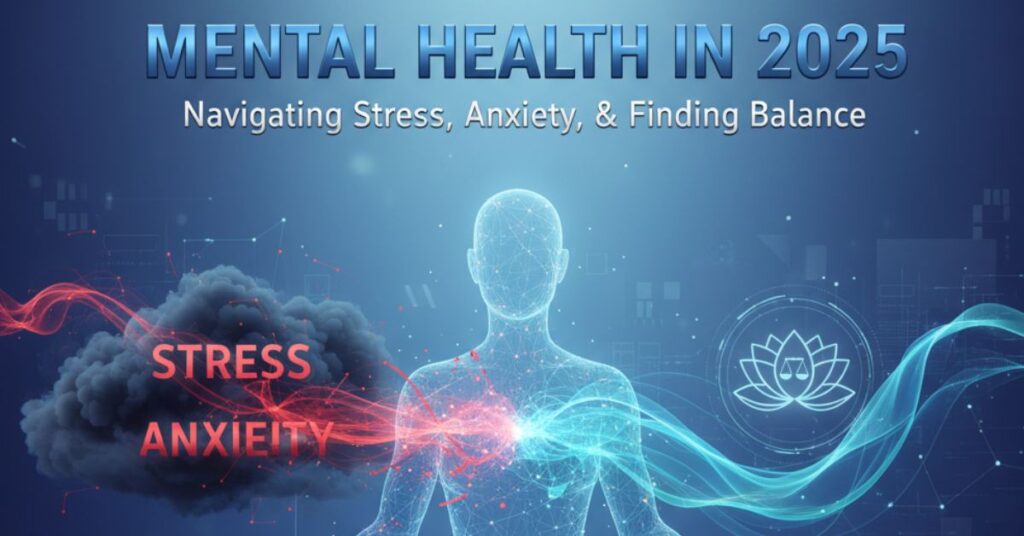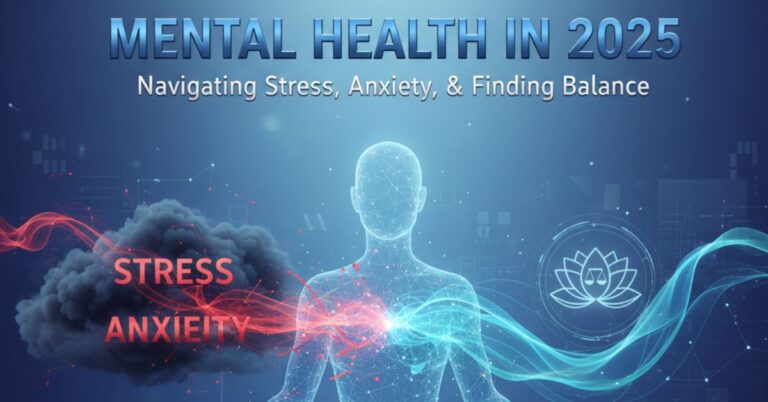
Introduction
Mental health isn’t just a buzzword anymore—it’s central to how we live, work, and connect. Yet, despite the growing awareness, so many people still feel overwhelmed. You know what? That’s completely normal. Between the rush of daily life in New York and the endless responsibilities in Delhi, it’s no wonder stress and anxiety have quietly become companions for millions.
Here’s the thing: mental well-being isn’t about perfection or meditating for hours daily. It’s about finding practical strategies that actually fit into your life. In 2025, with new technologies, cultural shifts, and an increasingly global conversation around mental health, managing stress has never been more accessible—or more crucial.
The Rising Importance of Mental Health
Globally, mental health is finally getting the attention it deserves. In the U.S., companies are offering therapy sessions as part of employee wellness packages, and apps like Calm, Headspace, or Talkspace are transforming how people access help. In India, traditional systems like Ayurveda, yoga, and meditation are resurging—not as outdated practices, but as holistic solutions to modern problems.
Why does this matter? Because mental health directly affects every aspect of life—sleep, productivity, relationships, and even physical health. Ignoring it isn’t an option anymore, and recognizing the signs of stress or anxiety early can change outcomes dramatically.
Modern Therapies That Actually Work
You don’t always need to rely solely on traditional therapy settings. Technology is bringing mental health care to your fingertips.
- AI-Powered Therapy Apps: Apps now offer cognitive-behavioral techniques, guided journaling, and real-time mood tracking. Imagine having a coach in your pocket reminding you to pause, breathe, or reframe a negative thought.
- Teletherapy & Online Counseling: Whether you’re in a bustling city in India or a quiet suburb in the U.S., scheduling online sessions has never been easier. The convenience removes barriers like commute stress or stigma.
- Virtual Reality (VR) Experiences: Some innovative programs use VR to simulate calming environments or guide exposure therapy for anxiety and phobias. It may sound futuristic, but it’s already improving outcomes for many.
Here’s the kicker: these tools don’t replace human empathy, but they supplement it. They provide daily nudges that help maintain emotional balance, which is exactly what people need in 2025.
Traditional Practices That Still Shine
Modern solutions are amazing, but let’s not forget the wisdom embedded in traditional practices.
- Ayurveda & Yoga: In India, centuries-old methods are showing measurable benefits. Simple routines like breathing exercises (pranayama), mindfulness meditation, or herbal teas (like Ashwagandha or Brahmi) help regulate stress hormones.
- Mindfulness & Meditation: Even in the U.S., mindfulness has gone mainstream, often integrated into schools, workplaces, and hospitals. A five-minute morning meditation can improve focus, reduce anxiety, and even lower blood pressure.
- Nature & Community Rituals: Spending time outdoors, joining local wellness communities, or practicing gratitude rituals—these seemingly small acts cultivate resilience and emotional stability.
The takeaway? Combining modern tools with timeless practices can create a holistic, sustainable approach to mental health.
Practical Tips for Daily Stress Management
So, what can you do today, tomorrow, or this week without overhauling your entire life? Let’s break it down.
- Short Daily Mindfulness: Just 10 minutes in the morning or evening. Use apps, music, or silence—whatever works for you.
- Structured Journaling: Write down three things you’re grateful for and one thing that stressed you. Reflection reduces mental clutter.
- Micro-Movements: Physical activity is not optional. Take short walks, stretch at your desk, or try yoga—your body and brain both benefit.
- Sleep Hygiene: Turn off screens 30 minutes before bed, stick to a schedule, and create a restful environment. Sleep is your brain’s reset button.
- Digital Detox Hours: Social media overload amplifies anxiety. Allocate time blocks to unplug.
- Talk It Out: Share feelings with friends, family, or counselors. Isolation worsens stress—connection heals.
Small, consistent actions like these can make a world of difference without feeling like a chore.
Mental Health in the Workplace
Another important angle in 2025: how we manage mental health at work. Whether it’s remote work in the U.S. or hybrid setups in India, burnout is real. Employers are recognizing that productivity and wellness go hand-in-hand.
- Flexible Scheduling: Control over work hours reduces anxiety and boosts focus.
- Mindfulness Programs: Some companies offer on-site or virtual meditation sessions—quick and effective.
- Peer Support Networks: Talking to coworkers about stress can normalize experiences and reduce stigma.
Honestly, workplaces that prioritize mental health don’t just help employees—they thrive because happy, balanced teams perform better.
The Role of Nutrition in Mental Wellness
Believe it or not, your brain needs proper fuel just like your body. Omega-3 fatty acids, vitamins, and minerals from whole foods can positively influence mood.
- India: Seasonal fruits, lentils, nuts, and herbal teas support both mental and physical well-being.
- USA: Incorporating leafy greens, whole grains, and fatty fish into daily meals improves energy and focus.
Simple dietary adjustments paired with hydration and balanced meals can amplify the benefits of mindfulness, exercise, and sleep.
The Social Dimension of Mental Health
Mental wellness thrives on connection. Loneliness or poor social interaction exacerbates stress.
- Community Engagement: Join wellness clubs, yoga classes, or neighborhood walking groups.
- Family & Friends: Regular meals, phone calls, or casual check-ins strengthen emotional support systems.
- Digital Communities: Even online support groups or forums provide validation, especially for niche concerns like anxiety triggers or workplace stress.
When mental health is social, it becomes not just manageable but enjoyable.
Conclusion: Balance Over Perfection
Mental health in 2025 isn’t a destination—it’s a continuous practice. It’s about understanding yourself, adopting habits that work for your lifestyle, and combining modern therapies with traditional wisdom.
Whether you’re navigating work stress in Chicago, family obligations in Bangalore, or just the everyday anxieties of life, small, consistent actions make a lasting difference.
So, what’s one thing you can do today to reduce stress, ease anxiety, or simply pause and breathe? Because mental wellness isn’t a luxury—it’s essential, universal, and fully within your reach.




